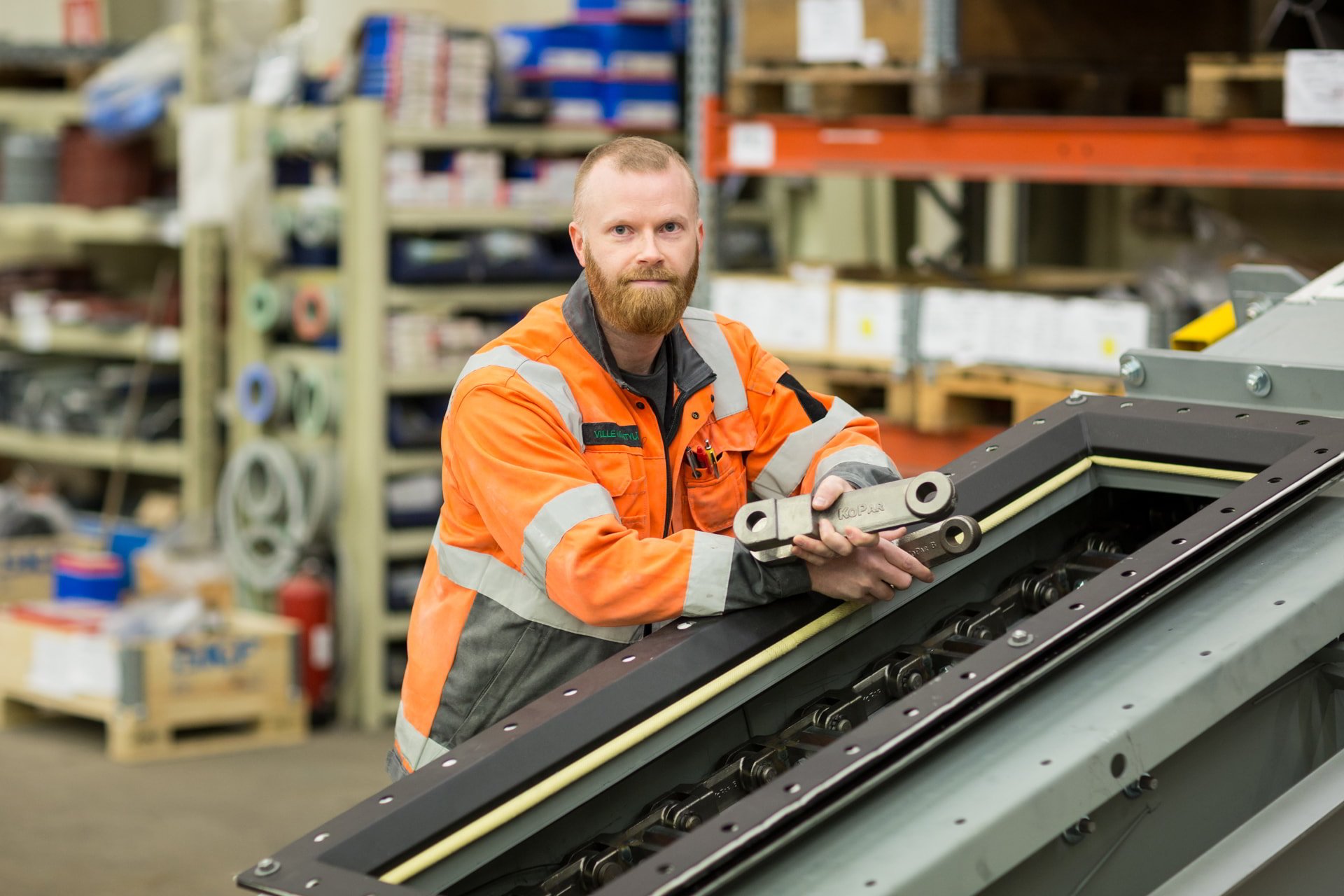Pneumatic and mechanical chain conveyors are industrial solutions also known as chain conveyors. These terms refer to the same basic concept, a device that efficiently transfers hot ash or other bulk materials. Since they are synonyms, there are no real differences between these conveyor solutions, and both serve the same purpose. Chain conveyors are particularly useful when you want to transfer hot ash safely and efficiently.
How do chain conveyors work?
Chain conveyors are an essential part of industrial material handling, especially in the transfer of hot ash. The basic principle of these devices is simple yet effective: a chain with attached paddles moves within a closed or partially closed channel, transporting the material to the desired location. This movement allows for continuous and even transfer of material, which is critical in many industrial processes.
The applications for chain conveyors are diverse. They are often used in power plants and metal smelting facilities, where handling high-temperature materials is commonplace. Additionally, they are well-suited to the needs of the chemical industry, which requires reliable and efficient material transport. Chain conveyors can operate in horizontal, vertical, or inclined positions, which increases their versatility.
During the transport process, chain conveyors can limit the spread of dust and splashes. This is due to their closed structure, which improves workplace cleanliness and safety. This feature makes chain conveyors particularly recommended in environments where cleanliness and safety are of utmost importance.
Why choose a chain conveyor for hot ash transfer?
Chain conveyors offer many advantages that make them an excellent choice for hot ash transfer. First, their ability to handle large amounts of material continuously and evenly makes them highly efficient. This performance is particularly important in industrial processes where material transfer is a critical part of production flow.
Secondly, chain conveyors are extremely durable and reliable. Their simple yet effective design ensures that they require relatively little maintenance compared to other conveyor systems. This reduces downtime and improves the reliability of production lines. Additionally, their closed structure helps maintain a safe working environment by reducing workers' exposure to hazardous materials.
Finally, chain conveyors are cost-effective in the long run. Although the initial investment may be significant, their long lifespan and low maintenance costs make them a financially sound choice. This makes them attractive solutions for companies looking to optimize resource use and reduce environmental impact.
What are the maintenance and upkeep needs of chain conveyors?
Regular maintenance of chain conveyors is essential to ensure their efficiency and durability. Regular inspection and maintenance help prevent potential failures and extend the device's lifespan. This means, for example, inspecting chains and paddles for wear and lubricating moving parts.
The need for maintenance can vary depending on the intensity of use and environmental conditions. For example, conveyors used in extremely hot environments may require special attention to withstand thermal stress. Similarly, the composition of the material being transported can affect maintenance needs, such as preventing corrosion.
Maintenance measures not only improve chain conveyor performance but also reduce downtime, which can lead to production interruptions. Therefore, regular inspections and proactive maintenance measures are key to ensuring the efficient operation of the device.
What are the safety considerations for chain conveyors?
Safety is of paramount importance in the use of chain conveyors, especially when handling hot and potentially hazardous materials. The closed structure helps reduce workers' exposure to these materials, but it is also important to follow other safety measures.
A key safety consideration is ensuring that all workers are properly trained in the use of chain conveyors. This includes understanding the operation of the device, identifying potential risks, and acting in emergency situations. Additionally, it is recommended to use personal protective equipment, such as heat-resistant gloves and goggles.
Safety also involves regular equipment inspection to detect and correct any faults before they cause dangerous situations. This highlights the importance of proactive maintenance, as it helps keep the device safe and operational under all conditions.
Kopar's role as a manufacturer of chain conveyors
At Kopar, we take pride in our long history and expertise in the manufacturing of chain conveyors. We specialize in providing solutions that are superior in performance and durability and that meet the most demanding industrial needs. Innovation and continuous development are the cornerstones of our operations.
We understand that each customer and application is unique. That's why we offer customized solutions that meet the specific needs of our customers. Whether it's a chain that withstands high temperatures or a conveyor that operates in explosive environments, we have the expertise and resources to provide the right solution.
We are committed to reducing the environmental impact of industrial processes by offering energy-efficient and sustainable products. This commitment not only improves the reliability of our customers' operations but also promotes the entire industry's green transition towards more sustainable practices.

You have a challenge that needs solving?
Let us help! Contact us for more information about our products and services.
